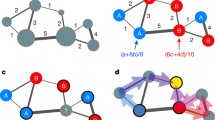Abstract
Humans form groups and congregate into groups for a variety of reasons and in a variety of contexts e.g., corporations in offline space and guilds in Massively Multiplayer Online Games (MMOGs). In recent years a number of models of group formation have been proposed. One such model is Johnson et al’s [10] model of group evolution. The model is motivated by commonalities observed in evolution of street gangs in Los Angeles and guilds in an MMOG (World of Warcraft). In this paper we first apply their model to guilds in another MMOG (EQ2)1 and found results inconsistent from the model’s predictions, additionally we found support for the role of homophily in guild formation, which was ruled out in previous results, Alternatively, we explore alternative models for guild formation and evolution in MMOGs by modifying earlier models to account for the existence of previous relationships between people.
Access this chapter
Tax calculation will be finalised at checkout
Purchases are for personal use only
Preview
Unable to display preview. Download preview PDF.
Similar content being viewed by others
References
Ahmad, M.A., Huffakar, D., Wang, J., Treem, J., Poole, S., Srivastava, J.: GTPA: A Generative Model for Online Mentor-Apprentice Networks. In: 24th AAAI Conference on Artificial Intelligence, Atlanta, Georgia, July 11-15 (2010)
Ahmad, M.A., Borbora, Z., Srivastava, J., Contractor, N.: Link Prediction Across Multiple Social Networks. In: Domain Driven Data Mining Workshop (DDDM 2010), ICDM 2010 (2010)
Bainbridge, W.S.: The Warcraft civilization: Social science in a virtual world. The MIT Press, Cambridge (2010)
Keegan, B., Ahmad, M.A., Williams, D., Srivastava, J., Contractor, N.: Dark Gold: Statistical Properties of Clandestine Networks in Massively-Muliplayer Online Games. In: IEEE Social Computing Conference, Minneapolis, MN, USA, August 20-22 (2010)
Castronova, E.: Synthetic worlds: The business and culture of online games. University of Chicago Press, Chicago (1995)
Epstein, J., Axtell, R.: Growing. In: Artificial Societies: Social Science from the Bottom-Up. MIT Press, Cambridge (1996)
Goffman, E.: The presentation of self in everyday life. Doubleday, Garden City (1959)
Guimerà, R., Spiro, U.: Team assembly mechanisms determine collaboration network structure and team performance. Science 308, 697–702 (2005)
Huang, Y., Zhu, M., Wang, J., Pathak, N., Shen, C., Keegan, B., Williams, D., Contractor, N.: The Formation of Task-Oriented Groups: Exploring Combat Activities in Online Games. In: Proceedings of IEEE, SocialComm-2009 (2009)
Johnson, N.F., Xu, C., Zhao, Z., Ducheneaut, N., Yee, N., Tita, G.: Human group formation in online guilds and offline gangs driven by a common team dynamic. Physical Review E 79(6), 066117 (2009)
Huffaker, D., Wang, J., Treem, J., Ahmad, M.A., Fullerton, L., Williams, D., Poole, S., Contractor, N.: The Social Behaviors of Experts in Massive Multiplayer Online Role-playing Games. In: 2009 IEEE Social Computing, SIN 2009, August 29-31 (2009)
Thurau, C., Bauckhage, C.: Analyzing the Evolution of Social Groups in World of Warcraft. In: Proc. IEEE Conf. on Computational Intelligence and Games (2010)
McPherson, M., Smith-Lovin, L., Cook, J.M.: Birds of a Feather: Homophily in Social Networks. Annual Review of Sociology 27, 415–444 (2001)
Mulligan, J., Patrovsky, B., Koster, R.: Developing online games: An insider’s guide. Pearson Education, London (2003)
Palla, G., Barabási, A.-L., Vicsek, T.: Quantifying social group evolution. Nature 446(7136), 664–667 (2007)
Schrader, P.G., McCreery, M.: The acquisition of skill and expertise in massively multiplayer online games. Educational Technology Research and Development 56, 557–574 (2008)
Williams, D.: The Mapping Principle, and a Research Framework for Virtual Worlds. Communication Theory 20(4), 451–470 (2010)
Williams, D., Ducheneaut, N., Xiong, L., Zhang, Y., Yee, N., Nickell, E.: From Tree House to Barracks: The Social Life of Guilds in World of Warcraft. Games and Culture 1(4), 338–361 (2006)
Author information
Authors and Affiliations
Editor information
Editors and Affiliations
Rights and permissions
Copyright information
© 2011 Springer-Verlag Berlin Heidelberg
About this paper
Cite this paper
Ahmad, M.A., Borbora, Z., Shen, C., Srivastava, J., Williams, D. (2011). Guild Play in MMOGs: Rethinking Common Group Dynamics Models. In: Datta, A., Shulman, S., Zheng, B., Lin, SD., Sun, A., Lim, EP. (eds) Social Informatics. SocInfo 2011. Lecture Notes in Computer Science, vol 6984. Springer, Berlin, Heidelberg. https://doi.org/10.1007/978-3-642-24704-0_19
Download citation
DOI: https://doi.org/10.1007/978-3-642-24704-0_19
Publisher Name: Springer, Berlin, Heidelberg
Print ISBN: 978-3-642-24703-3
Online ISBN: 978-3-642-24704-0
eBook Packages: Computer ScienceComputer Science (R0)




